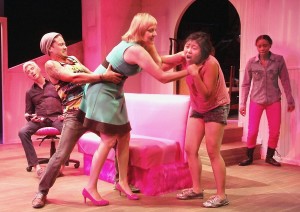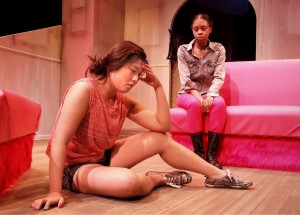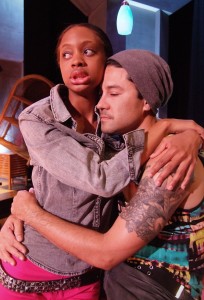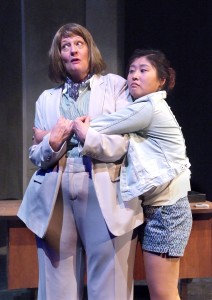Notes from Arden
Alice Tuan’s Hit
By Steven Leigh Morris
RECOMMENDED:

Playwright Alice Tuan’s description of her own play’s title, Hit, as explained in her program note, suggests a work so fragmented that one scene has little to do with the next: “I started by writing five scenes where each scene had some sort of hit in it; hit by a car, hit on by an older woman, hit of a joint, a hit in the eye. . . ”
Tuan further expounds on her play’s elliptical nature by comparing its structure to that of Los Angeles, where it takes place: Both have no center, but many centers.

However, the various scenes in Hit actually do hold together, much in the same way L.A. neighborhoods hold the city together: In the city there are streets and freeways interlinking the patchwork; in the play, there are motifs and metaphors and characters’ relationships that bind. Hit isn’t so much a drama as a comedic- despondent point-of-view on what it means to be alive here, in our perverse sliver of history.
One can’t write about Los Angeles without writing about appetite. If there’s a freeway connecting one edge of Tuan’s Los Angeles to the other, it’s the voracious appetites of her five characters, appetites for food, sex, wealth – appetites like blankets over spiritual voids.
A freeway accident brings a bewildered young Korean-American woman named Kim (Kahyun Kim) together with the hunky college student, Mank (Justin Huen), whose truck careened into her car. The sparks that instantly fly aren’t just from their vehicles. Kim leaps into bed with Mank, despite her being in a precariously committed relationship with a silver-haired Frenchman named Luc (Lenny von Dohlen), a sexually open-minded fellow (he is French, after all) who loathes Los Angeles and may have finally dragged up the necessary investors to open his dream eatery in New York. A living shrine to his own lusts, Luc has been partnered for some 20 years with Kim’s adoptive Caucasian mother, a now obese professor of economics named Sharon (Carolyn Almos). Sharon would happily drop everything to follow Luc to NYC, but his heart (among other organs) tilts more towards Kim, whose heart (among other organs) tilts towards Mank, who, it turns out, is one of Sharon’s students. Also in this capricious mix of ethnicities is Serena (Taylor Hawthorne), Kim’s black friend whose primary motivations are to separate Kim from Luc, and to articulate to the jaded Frenchman the cryptic urban virtues of Los Angeles.

If this above description implies layers of psychological realism, it’s a disservice. These aren’t so much characters as human torpedoes propelled by their appetites and ricocheting off each other in a comedy of despair. Even with their dark sides, these aren’t layered characters, the type written by, say, Edward Albee. Tuan’s characters are more like phantoms, human aspects wandering around a poem. If you had them over for dinner, they might just evaporate between the salad and dinner courses – just when you were asking about their childhoods.
The fine actors flesh out their ethereal essences with flesh, blood, conviction and animation. But that still doesn’t make them anything but ghosts. Their function is conceptual. Those are Tuan’s rules. If you don’t like those rules, go see a play by Tennessee Williams.

Where there might have been a central conflict, Tuan constructs instead a central concept: that we’re all eating each other alive, under the shade of Sharon’s macroeconomics, and over the bough of her microeconomics. Sharon explains how money moves, through economies, through our veins. Sharon understands economics and she’s grown fat. Really, really fat. Her fat is the consequence of a quality of life, of some unfettered lust that describes every character in Tuan’s play. The place of gorging is the palace we’ve come to call a cathedral.
Director Laurel Ollstein keeps the play afloat with a nimble jocularity, a levity that tilts towards kitchiness, perhaps of necessity, or the play would drown in its own dystopic undercurrents.
This play is very much like Los Angeles. You try to define it, to circumscribe it, and it slips out from your grasp. Rather, the play emotes a feeling, a comedic, horrific depiction of how we’ve learned, or been seduced by macroeconomics, to keep crashing into each other and fleeing, eating and fucking, rising and falling.
Hit is being performed at Los Angeles Theatre Center, Thurs.-Sat., 8 p.m.; Sun., 3 p.m.; through June 8. (866) 811-4111, www.thelatc.org
Lovell Estell III interviews Alice Tuan this week on Stage Raw

